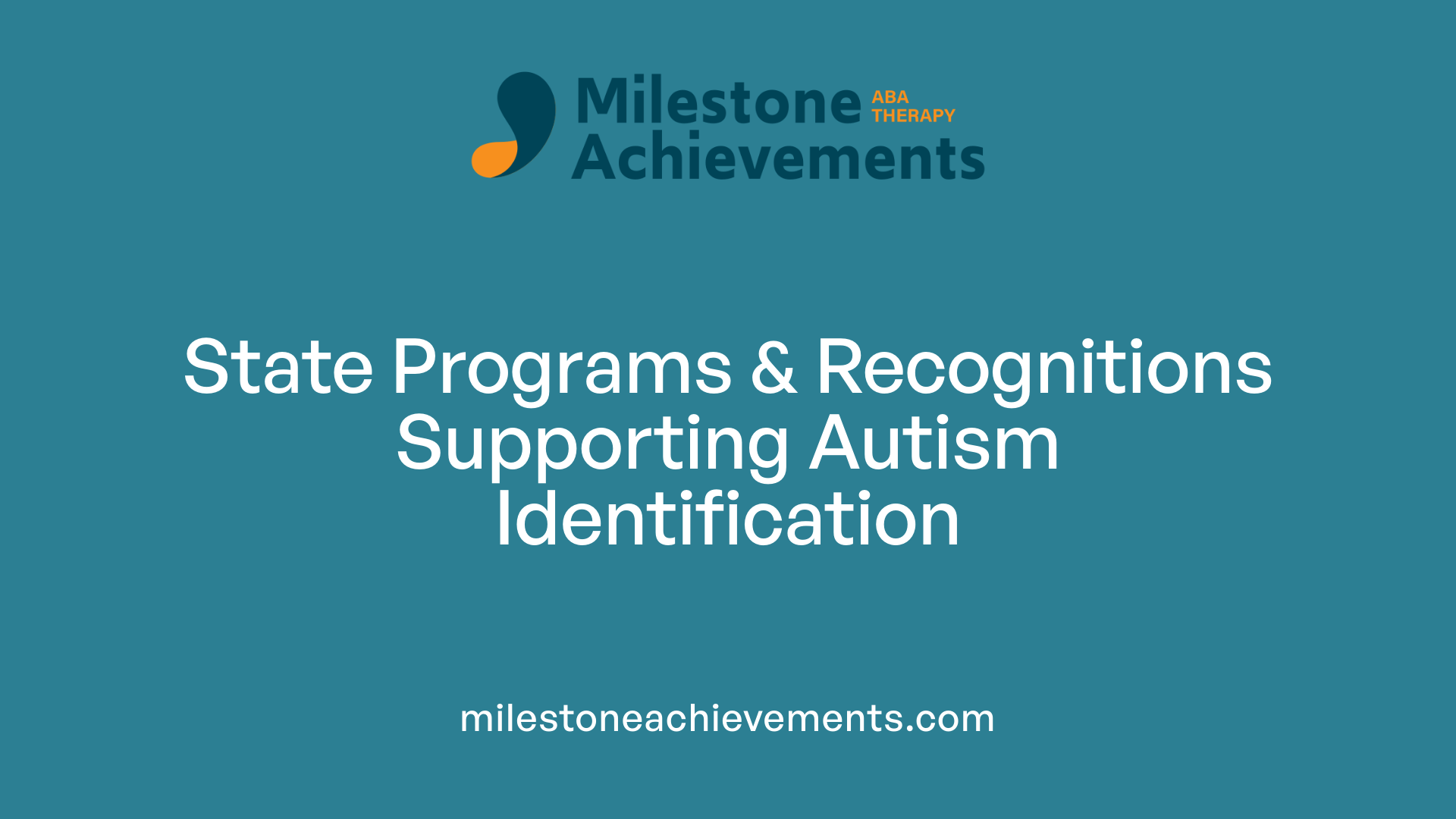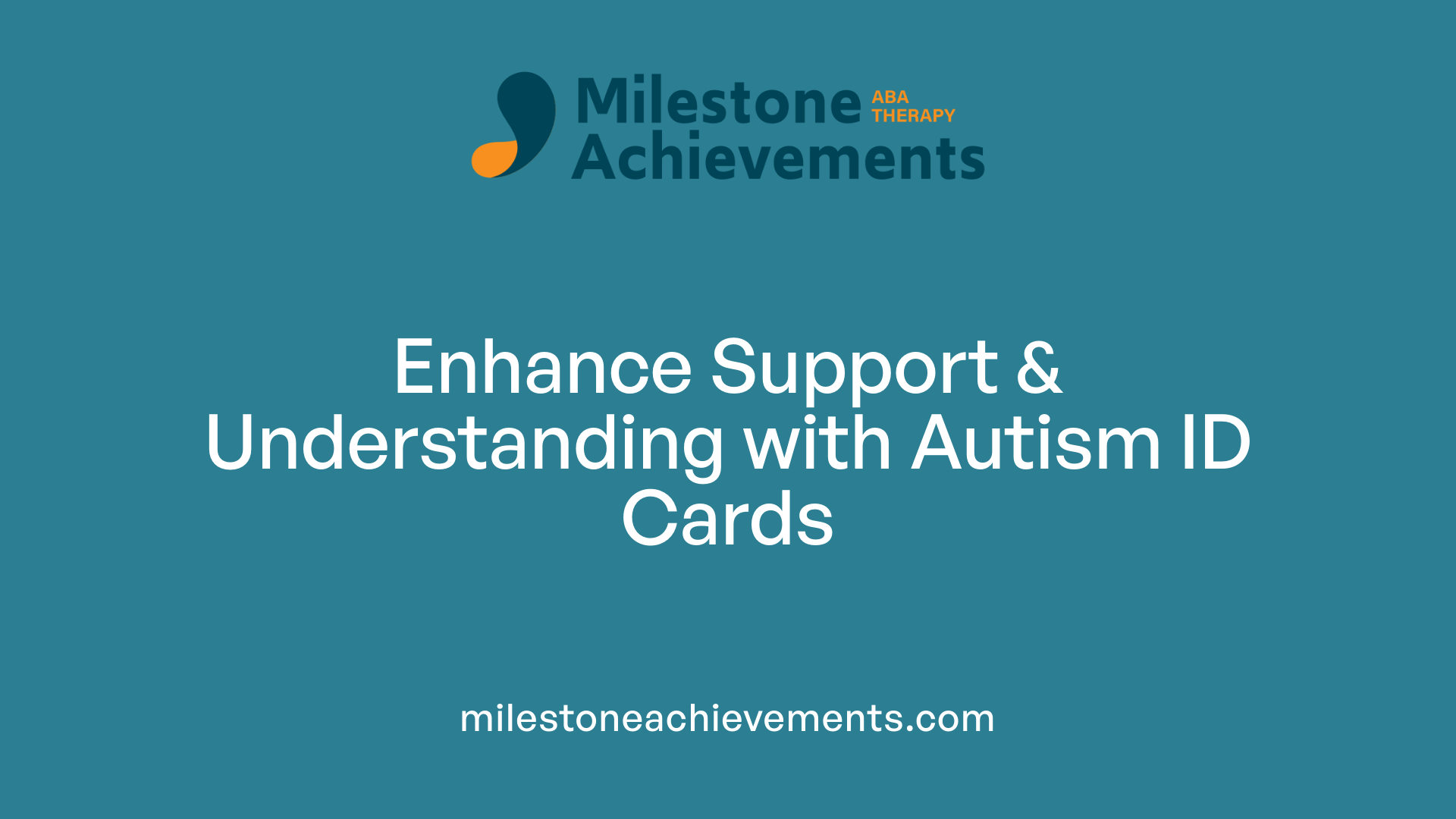
Purpose of Autism Identification Cards
Understanding the Role and Benefits of Autism Identification Cards
A Tool for Safety, Support, and Awareness
Autism identification cards are crucial tools designed to assist individuals on the autism spectrum in navigating daily interactions, especially during emergencies or unfamiliar settings. They serve not only as communication aids but also as symbols of awareness and understanding in society. This article explores the purpose, functionalities, and significance of these cards, emphasizing how they improve safety, foster independence, and promote societal support for autistic individuals.
What Are Autism Identification Cards and How Do They Function?

What is an autism ID card?
Autism ID cards are portable identification tools designed to help individuals with autism communicate important information about themselves during interactions with others. These cards often contain personal details, emergency contacts, and specific support needs like sensory sensitivities or communication preferences. They may also include a photograph and space for notes about calm-down techniques or triggers.
How do autism identification cards assist in communication?
These cards serve as a bridge in communication, especially when verbal exchange is difficult. They provide clear, immediate information that can help first responders, healthcare providers, or bystanders understand the person’s autism diagnosis and needs. This can lead to more supportive and appropriate responses, reducing confusion or distress during interactions.
Situations where autism ID cards are used
Autism ID cards are particularly valuable in situations where an autistic person might have trouble explaining their needs or might become overwhelmed. Common scenarios include during emergency responses with police, medical emergencies, travel, shopping, or in unfamiliar environments. They are also useful if the individual is lost or unable to communicate due to sensory overload or anxiety.
Additional details
These cards can be created by individuals themselves, downloaded, printed, or accessed via apps for convenience. Some states issue official cards or symbols on driver’s licenses to indicate autism, and programs like the Blue Envelope or specialized ID cards help support law enforcement interactions.
| Use Case | Purpose | Example Situation |
|---|---|---|
| Emergency situations | Help responders understand a person’s condition and needs | During a medical emergency or police encounter |
| Law enforcement interactions | Facilitate effective communication and reduce misunderstandings | Traffic stop or when lost in public |
| Public and retail settings | Aid staff in providing appropriate support or assistance | Shopping or attending public events |
| Travel and transport | Ensure safety and support in unfamiliar environments | Boarding a flight or riding public transport |
These identification tools are part of broader efforts to ensure the safety, understanding, and inclusion of individuals on the autism spectrum.
Legal Recognitions and State Programs Supporting Autism Identification
 Various states across the U.S. have implemented programs and laws to support individuals with autism in gaining official recognition and support through identification markers on driver’s licenses, ID cards, and special alert systems.
Various states across the U.S. have implemented programs and laws to support individuals with autism in gaining official recognition and support through identification markers on driver’s licenses, ID cards, and special alert systems.
In Kansas, autism can be indicated on driver’s licenses or IDs, helping law enforcement quickly identify individuals with autism during traffic stops or emergencies. Connecticut’s Blue Envelope Program provides drivers with autism a blue envelope containing essential documentation, simplifying communication with police.
Alabama was the first state to offer an officially recognized Autism Identification Card issued by county health departments. This card confirms a person’s autism diagnosis and offers details to assist first responders. Applicants must verify their diagnosis with healthcare providers and present ID in person.
Alaska supports a symbol on driver’s licenses for those with cognitive or physical disabilities, including autism, making it easier for authorities to identify these individuals. Similarly, Delaware and the District of Columbia allow residents to request an autism indicator on their driver’s licenses.
In many other states such as Florida, Illinois, Michigan, and Texas, law enables individuals to request symbols or indicators on their driver’s licenses or ID cards, promoting safety and awareness. These markers help law enforcement, emergency responders, and service providers recognize autism or communication challenges at a glance.
Additionally, organizations like the WV Autism Training Center and the Pasco Sheriff’s Office offer specialized cards designed to aid individuals with autism in everyday settings and emergencies. These cards often include personal details, communication tips, and sensory sensitivities.
In New Jersey, a voluntary autism designation can be added to official IDs, providing benefits during law enforcement encounters or medical emergencies. Applicants usually need to submit diagnosis proof and personal identification. These efforts aim to improve understanding and support for autistic individuals in public and safety contexts.
Overall, these programs aim to recognize autism openly, facilitate communication, and enhance safety. They also promote societal awareness and understanding, emphasizing the importance of tailored support systems.
| State | Program Name | How to Access | Additional Details |
|---|---|---|---|
| Alabama | Autism ID Card | Apply through county health departments; verified by healthcare provider | Issued after diagnosis verification; costs $10; valid for 3 years |
| Kansas | Autism indicator on licenses | Request via DMV | Recognized symbol on driver’s license to alert authorities |
| Connecticut | Blue Envelope Program | Enrollment by law enforcement or health providers | Contains insurance and registration info for police |
| New Jersey | Autism designation on licenses | Submit diagnosis proof and ID at MVC Licensing Centers | Officially marked as autism/communication disorder |
| Multiple States | Various symbols or indicators | Request through state DMV or equivalent agency | Aids in identification and tailored emergency response |
These state-level efforts collectively aim to empower autistic individuals with recognition tools, ensuring they receive appropriate understanding and support in various settings.
Design and Features of Autism Identification Cards
 Autism identification cards are designed to be practical and user-friendly, mimicking the size and quality of a driver’s license to ensure portability. They often include a photograph of the individual and personal details, making them easily recognizable and usable in various situations.
Autism identification cards are designed to be practical and user-friendly, mimicking the size and quality of a driver’s license to ensure portability. They often include a photograph of the individual and personal details, making them easily recognizable and usable in various situations.
These cards typically feature specific information that helps others support the person with autism. They may include touchpoints like communication preferences, sensory sensitivities, and calming strategies to assist first responders or service providers in understanding the individual’s needs quickly.
Most cards have dedicated spaces for emergency contacts, medical information, and personal support needs, making it easier to provide tailored assistance. Some designs also include visual symbols that indicate cognitive or sensory sensitivities, which can alert authorities or caregivers to the person’s specific challenges.
In addition to basic info, many cards are crafted to be durable—they are usually laminated or encased in protective covers to withstand daily use. The incorporation of these thoughtful design features ensures that autism identification cards serve as a reliable tool to promote safety, understanding, and effective communication.
The Impact and Benefits of Autism ID Cards on Society

What are the benefits of having an autism card?
Autism ID cards provide numerous advantages for individuals on the spectrum. These cards enhance communication by offering a clear, visual way for the person to share their support needs, preferences, and sensory sensitivities. This can help reduce misunderstandings and foster greater independence.
They serve as a helpful tool in various settings—including healthcare, transportation, and when interacting with police or emergency responders—by clearly indicating the individual has autism and may require specific accommodations or support.
In travel scenarios, autism-friendly features such as visual guides, social stories, and sensory-safe spaces at airports make journeys less overwhelming.
Moreover, autism cards help ensure that individuals receive the appropriate care and support, aligning with legal protections like the Irish Disability Act 2005 and EPSEN Act 2004. Overall, they promote societal understanding and inclusion, creating a more supportive environment for autistic individuals.
Why is it important to identify autism through such identification cards?
Identifying autism via cards or official indicators significantly improves support during emergencies or challenging interactions. Visual identifiers—such as decals, cards, or symbols—allow law enforcement, medical personnel, and caregivers to quickly recognize autism and respond appropriately.
This rapid recognition reduces risks of misunderstandings, anxiety, or potential harm, especially in stressful situations where verbal communication may be difficult.
Programs like the Blue Envelope or MedicAlert offer emergency notifications, wandering alerts, and additional safety features that protect individuals with autism.
Self-disclosure via these identification tools promotes acceptance and understanding, encouraging environments where autistic people feel safe and supported. These identifiers also aid in fostering independence and community participation by making spaces and services more accessible.
A Step Toward Greater Understanding and Safety
Autism identification cards serve a vital role in promoting safety, enhancing communication, and fostering societal awareness and acceptance. By providing invaluable support during emergencies, everyday interactions, and travel, these cards empower autistic individuals to navigate the world with greater independence and dignity. Increasing state recognition, legal support, and public awareness are essential to maximizing their benefits, ensuring that society becomes more inclusive, understanding, and responsive to the needs of those on the autism spectrum.
References
- Autism Identification Cards - PAAutism.org
- Autism and driving: Ways to identify as autistic when driving
- ID Products - WV Autism Training Center - Marshall University
- Exploring the benefits and challenges of autism alert cards - PMC
- Autism Spectrum Disorder Identification Cards Issued at County ...
- Aspect Autism Alert Card
- Police Cadet Perceptions on the Use of Identification Cards for ...


Partner with us on your child's journey
Milestone Achievements offers evidence-based ABA therapy to help children with autism reach their full potential. Together we’ll set meaningful goals and celebrate progress every step of the way.
Start ABA Services Today





